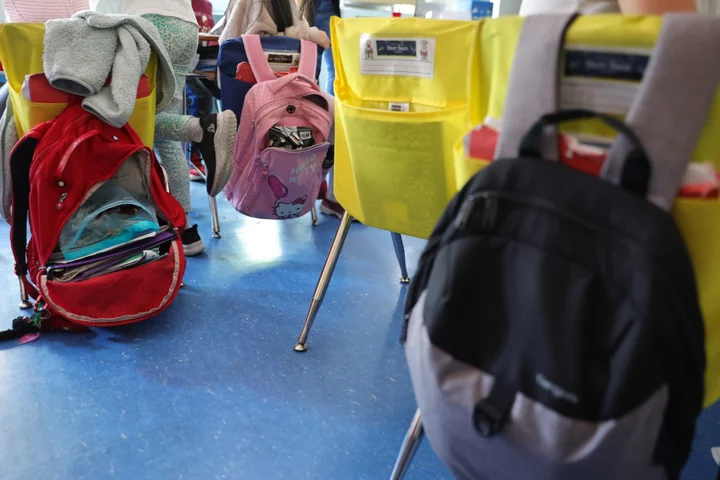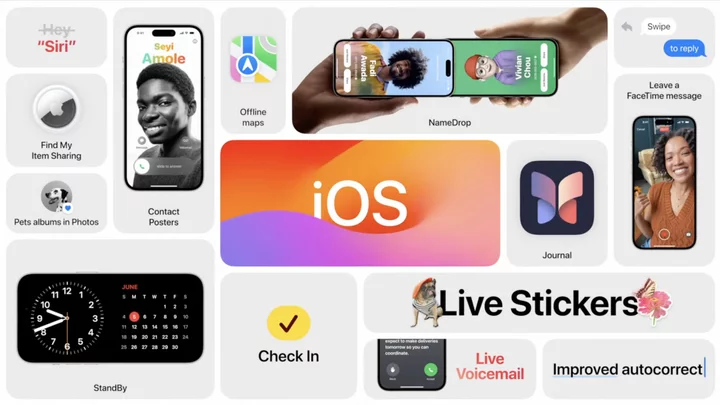As kids and educators settle into a new school year, a little bit of generosity can go a long way in helping teachers in underfunded schools meet their students' needs.
Historically, U.S. public education has undergone massive budget cuts, alongside growing teacher-to-student ratios and decreasing salaries. The National Education Association, a nationwide advocacy network for public education, has documented a concerning educator pay gap, finding that educators are paid 81 cents on the dollar compared to other professionals with similar experience and credentials.
"Teachers continue to spend out of pocket to ensure that their students have the resources they need. In fact, the amount continues to go up every year," said Alix Guerrier, CEO of DonorsChoose, an education nonprofit that has helped crowdfund millions of classroom project requests. According to a 2023 DonorsChoose survey, teachers spent an average of $687 of their own money last year to support their classrooms. The number was even higher for teachers of color, who reported spending an average of $714, Guerrier noted.
SEE ALSO: OpenAI releases new teacher guide for ChatGPT in classroomsJuan Brizuela, public relations manager for DonorsChoose, explained that the website exists to facilitate every level of support for educators nationwide. "The reason we exist as a platform is because we know each classroom, each teacher, may have a very unique need based on their students, where they live, how many students they have to teach in the classroom…you name it," he said. "We always like to say donors can donate to their favorite teacher, their child's teacher, a school they went to as a kid — we just ask donors to donate to whatever it is that inspires them."
Guerrier explained that educator needs span a diverse range of topics and trends. "For example, teachers are continuously finding new ways to incorporate technology into their practice, so every year we see more requests for more kinds of technological resources. But some trends may be less intuitive; for example, furniture is our fastest-growing resource category on DonorsChoose."
The site's donors are frequently made up of fellow educators and even big industry names. DonorsChoose also partners annually with major donors to boost teacher fundraisers, including a recent campaign supported by the Bill & Melinda Gates Foundation that raised $8 million for classroom projects. But the majority of donors are just everyday individuals looking to support teachers how they can.
"Even a small donation can make a huge difference, because independent of the monetary value each donation is a vote of confidence for that teacher," said Guerrier.
In addition to the work of nonprofits like DonorsChoose, online communities are rallying behind a "Clear The List" movement to support teachers in need. It's facilitated in part by the popularity of educator influencers and teacher spaces on social media sites like TikTok and Instagram. Many of these educators use Amazon Lists and Linktree – a social media link landing page — to garner support for their classrooms and share resources. According to Linktree data, 2.6 million Linktree users across social platforms identify as within the education field, and they generated 95 million clicks to their profiles between June and July this year.
SEE ALSO: From lake science to bones to snails, these TikTok accounts are STEM treasure trovesAnd "11,500 of those 'Education Linkers' are incorporating 'wishlist' into their titles or links, demonstrating the growing influence of Gen Z and millennial teachers in leveraging their online presence to fulfill their classroom needs," Linktree explained.
As students return to school, here are some ideas on how to help teachers in tangible ways.
1. Get flexible seating into their classrooms
For the 2023 school year, Brizuela and Guerrier said the number-one requested category among teachers fundraising on DonorsChoose is flexible seating and desk options for students — a form of accommodation that benefits both students with different physical needs and those that need specific forms of stimulation to manage the classroom environment.
Popular flexible seating options include things like wiggle or wobble stools, which allow children to move around in the "chair" safely, and flip chair floor cushions, which bring students down to floor level. Flexible options don't need to be fancy, though, and can be as simple as floor rugs for classroom group activities. "For a lot of teachers, it's been one answer out of many for keeping students engaged, focused, and concentrated," Brizuela said.
The DonorsChoose website features more than 15,000 campaigns for similar flexible seating options.
2. Help fund educational kits and learning games
Educational kits offer interactive classroom activities that combine hands-on education and engaging play and can be an effective way to encourage kids to have fun while learning.
"Think of things like kits and games that make learning interactive for the students," Brizuela explained, noting examples like multilingual versions of board games and outdoor activity kits.
Find a plethora of campaigns for these kinds of activities by searching the DonorsChoose website.
3. Provide a 21st century education
According to DonorsChoose, teachers consistently rank technology as the most urgent expenditure schools can make. Take a look through requests for tablets, smart boards, and more by searching "Computers & Tablets" on the site.
Brizuela noted a continued demand for tech accessories, like headphones and even hard drives. He also added that technology doesn't just mean physical hardware — many teachers request funding for instructional tech, which includes things like academic games and other software that aids learning.
As many students have limited or no access to technology at home, their school becomes crucial for acquiring modern computer skills. Getting early exposure — in all its forms — to technology can help them prepare for future careers, and it also supports students with specialized learning needs.
Accessibility is key, and tech helps teachers who have students with disabilities. Credit: DonorsChoose4. Expand classroom libraries
Helping teachers expand their classroom libraries can make a difference, as well. A lot of teachers request graphic novels or books that are coming out as movies so their students can connect with the material on multiple levels.
Scholastic also has "ready-to-go" classroom libraries for each grade level. Partnering with other parents is one way to boost your impact by purchasing a collection for a local teacher.
5. Cover classroom basics
Classroom basics are often the first items teachers pay for out of pocket: pens, pencils, erasers, paper, and cleaning supplies quickly add up, but they're must-haves for a successful classroom.
6. Help teachers start a school garden
Class gardens teach students about life cycles, nutrition and health, sustainability, and the environment, as well as responsibility, observation, and teamwork. They're also a unique way to support your child's teacher or school.
If you want to do more than donate to a class garden project at DonorsChoose as a way to bring an outdoor garden to your school, consider talking to school officials and plan to take on the responsibility of organizing the project, as not to put extra labor on already over-stretched school faculty. Use clear talking points, and consider leaning on a starting guide to reach those who need convincing. You can also get in contact with groups like Out Teach, formerly REAL School Garden, an organization that partners with high-poverty schools to encourage outdoor learning and build community gardens.
7. Support the arts
Supporting art teachers in need of construction paper, paint brushes, instruments, and more can help keep classroom creativity thriving. Funding for music and visual and performing arts is often one of the first department allocations to get cut from a school budget. Many students also don't have the money for instruments or expensive arts supplies and rely on their school for these opportunities.
8. Help teachers take students on an adventure
Teachers are constantly thinking of ways to expand learning outside the classroom, but it is not so easy to make this happen. Field trips can be time-consuming to plan and expensive to execute, and became nearly unfathomable during the country's public health crises. To help teachers figure out ways to broaden their students' experiences, check out these virtual projects and in-person adventures on DonorsChoose.
9. Support students who are struggling with poverty
A lot of teachers pay out of pocket for food and even clothes, shoes, and personal hygiene items for their students. With the right essentials, students can come to school clean, comfortable, fed, and confident, ready to focus on their school work. DonorsChoose can connect you with teachers raising money to support their low-income students.
DonorsChoose also has a specific Equity Focus designation on its site, launched in 2021 to address growing racial socioeconomic inequality, which allows donors to filter through schools where at least half of its population identify as students of color and at least half of the students come from low-income households and qualify for free or reduced price lunch.
Another option to support teachers and their students is to contact your local food bank. Feeding America, an anti-hunger organization with a network of 200 food banks across the country, has a BackPack Program that prepares bags of food for low-income children. In 2022, network BackPack programs served over 54 million meals, according to Feeding America.
10. Help teachers instruct their students on tolerance and diversity
Teachers need help preparing students for an inclusive, diverse society and ways to teach about current political and social issues. There are several crowdfunding projects on DonorsChoose focused specifically on tolerance and diversity. Teachers have previously asked for funding on projects that celebrate students' heritages, resources like picture books about tolerance, and activities about identity and racial justice, according to the site.
This also extends to teachers seeking to make their educational environments more accessible and identity-affirming for students with disabilities and LGBTQ+ communities. Check out the DonorsChoose #rainbow Giving Page for campaigns that "focus on queer history, queer and trans representation, queer student community, the intersection of race and queerness, and projects that actively welcome queer youth." There are also specific search categories for campaigns focused on racial justice and representation and students with disabilities.
Brizuela said that many educators are specifically seeking out more culturally relevant books and learning materials. "We've really made note of how many teachers ask for identity-affirming resources, and more often than not, it is books, whether that be books about Black history, books that focus on LGBTQ+ and queer figures in history, how people made a difference in different communities — we see them all."
"Beyond money and goods, goodwill and appreciation goes a long way," added Guerrier. "We’re in a moment in time when students and teachers are the victims of intense political battles, but this will only happen if we in the general public allow it to. If instead, we demand that teachers, in partnership with parents and their communities, be allowed to address the needs of their students free from the politicized environment, it would be one of the most valuable forms of support we could provide."
UPDATE: Sep. 6, 2023, 3:15 p.m. EDT An original version of this story was published in July 2018. It was updated with additional reporting by Chase DiBenedetto in September 2022 and September 2023.









